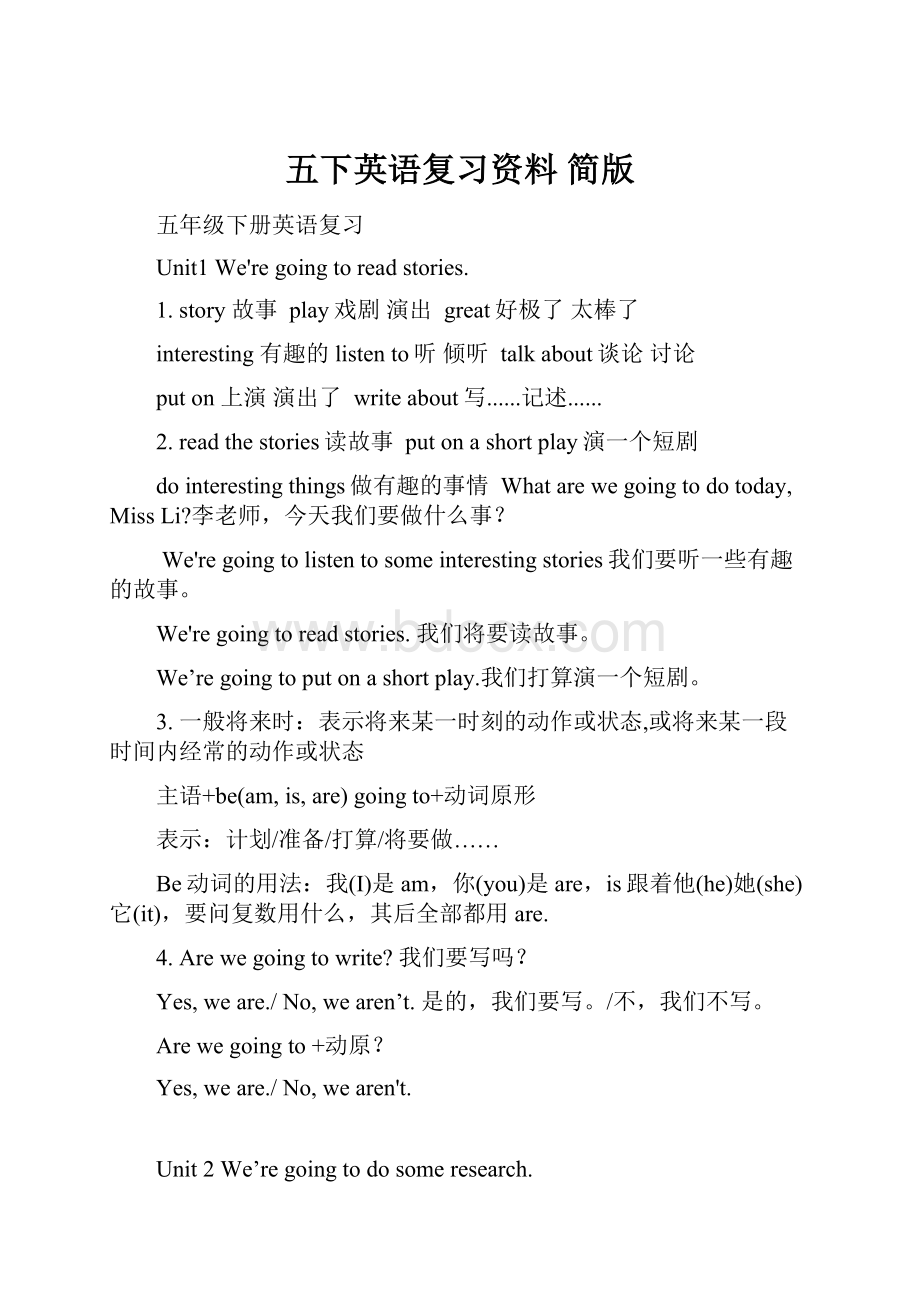五下英语复习资料简版.docx
《五下英语复习资料简版.docx》由会员分享,可在线阅读,更多相关《五下英语复习资料简版.docx(14页珍藏版)》请在冰豆网上搜索。

五下英语复习资料简版
五年级下册英语复习
Unit1We'regoingtoreadstories.
1.story故事play戏剧演出great好极了太棒了
interesting有趣的listento听倾听talkabout谈论讨论
puton上演演出了writeabout写......记述......
2.readthestories读故事putonashortplay演一个短剧
dointerestingthings做有趣的事情Whatarewegoingtodotoday,MissLi?
李老师,今天我们要做什么事?
We'regoingtolistentosomeinterestingstories我们要听一些有趣的故事。
We'regoingtoreadstories.我们将要读故事。
We’regoingtoputonashortplay.我们打算演一个短剧。
3.一般将来时:
表示将来某一时刻的动作或状态,或将来某一段时间内经常的动作或状态
主语+be(am,is,are)goingto+动词原形
表示:
计划/准备/打算/将要做……
Be动词的用法:
我(I)是am,你(you)是are,is跟着他(he)她(she)它(it),要问复数用什么,其后全部都用are.
4.Arewegoingtowrite?
我们要写吗?
Yes,weare./No,wearen’t.是的,我们要写。
/不,我们不写。
Arewegoingto+动原?
Yes,weare./No,wearen't.
Unit2We’regoingtodosomeresearch.
1.research调查、研究find找到、发现information信息study学习、研究think想、思考report报告wild野生的textbook教科书soil土壤seed种子plant种植、植物
2.dosomeresearch做些研究readandfind阅读并发现
collectpictures收集图片studyandthink研究与思考
writeareport写一份报告
3.Whatarewegoingtodotoday?
今天我们将要做什么事?
We’regoingtodosomeresearch.我们要做些研究。
We’regoingtoreadandfindinformation.我们将要阅读和查找信息。
We’regoingtocollectpictures.我们将要收集图片。
We’regoingtostudyandthink.我们将要学习和思考。
We’regoingtowriteareport.我们将要写一个报告。
4.一般将来时的特殊疑问句的构成及用法:
特殊疑问词+be动词+人称+goingto+要做的事情?
用来询问别人将要做什么?
如:
Whatishegoingtobuy?
他打算买什么?
Heisgoingtobuysomeapples.他打算买一些苹果。
5.find强调找的结果lookfor侧重寻找的过程
Unit3Let’smakeakite.
1.kite风筝show展示paper纸bamboo竹子
cut切、削、剪tie系
2.makeakite制作风筝showyou/us给你们/我们看needpaperandbamboo需要纸和竹子cutthebamboo削竹子
cutthepaper剪纸apieceof一张/一片
paintitwithabrush用毛笔涂色drawapicture画一幅画gluethepaper粘纸onthebamboo在竹子上
Showtotheclass向同学们展示
3.First,…Then,…Andthen,…Next,…Lastly,…
首先,.....然后,.....再然后,.....接下来,.....最后,.....
4.MissLiisshowingushowtomakeakite.
李老师正向我们展示如何做风筝。
5.First,cutthebamboo.首先,削竹子。
Andthen,cutthepaper.然后,剪纸。
Next,drawapictureandpaintitwithabrush.接下来,画一幅画并用毛笔给它涂色。
Lastly,gluethepaperonthebambooandtieastringtothekite.最后,把纸粘在竹子上并系根绳子在风筝上。
5.showsbsth向某人展示某物
Let’sdosth.让我们做.....
Let’smakeakite.让我们制作一个风筝。
特殊动词用法口诀:
一些动词要掌握,have,let和make,此三动词是使役,注意观察听到see,还有feel和watch,使用它们要仔细,后接宾补略去to,此点千万要牢记。
Unit4Don'ttalkhere.
1.here在这里Mrs夫人/太太take把.....带往Library图书馆park公园throw丢/扔waste废弃的floor地板
road道路
2.inthelibrary在图书馆里inthereadingroom在阅览室里
eatacake吃个蛋糕writeonabook在书上写
inclass在课堂上intheclass在班上throwwastepaper扔废纸onthefloor在地板上onthewall在墙上ontheroad在路上
playfootball踢足球pickflowers摘花inthepark在公园里
3.表示命令、要求、请求或劝告语气的句子被称为祈使句。
肯定句:
动词原形+其它否定句:
Don’t+动词原形+其它
Closethedoor,please!
请关门!
Don’tclosethedoor.不要关门。
4.Don'ttalkinthelibrary.不要在图书馆里说话。
Don'teatinclass.不要在课堂上吃东西。
Don'tthrowwastepaperonthefloor.不要把废纸扔到地上。
Don'tdrawonthewall.不要墙壁上乱画。
Don'tplayfootballontheroad.不要在马路上踢足球。
Don'tpickflowersinthepark.不要在公园里摘花。
Don't+动词原形Don't=Donnot
5.MrsChenistakingDongdongtothelibrary.陈太太正带着东东去图书馆。
6.Paullikesreading.保罗喜欢阅读。
Like+动词-ing表示“喜欢做……”
祈使句用法口诀:
祈使句,祈使句,请求、命令或建议。
主语you常省去,动词原形开头记。
否定形式要注意,句首要把Don't加。
要讲客气用please,句首句末没关系。
Unit5When'syourbirthday?
1.月份:
January一月February二月March三月April四月
May五月June六月July七月August八月
September九月October十月November十一月December十二月
2.序数词:
first第一second第二third第三fourth第四fifth第五sixth第六seventh第七eighth第八ninth第九tenth第十
……
3.tomorrow明天tonight在今晚inMarch在三月
InternationalChildren'sDay国际儿童节inMay在五月
onthefifthofMay在五月五日onthefourthofMay在五月四日onthefirstofJune在六月一日monthsoftheyear一年中的月份
4.When'syourbirthday?
你的生日是什么时候?
MybirthdayisinMarch.我的生日在三月。
It'sonthefifthofMarch.三月五日。
5.When'sLingling'sbirthday?
玲玲的生日在什么时候?
Lingling’sbirthdayisonthefifthofMarch.玲玲的生日在三月五日。
6.It'sonthefirstofJune.在6月1日(the+序数词﹢of﹢月份)
7.介词in、on和at表示时间的用法:
in﹢月份、年份
on﹢具体的某一天
at﹢具体的某一点、某一时刻或年龄等
8.helpsb(to)dosth帮助某人做某事
helpsbwithsth
Unit6I’llmakeabeautifulcard.
1.Mother’sDay母亲节favourite最喜欢的chocolate巧克力
rose玫瑰花celebrate庆祝restaurant餐馆buy买
card贺卡luckystar幸运星gift礼物
2.nextSunday下个星期天makeabeautifulcard做一张美丽的卡片
whatabout…怎么样?
aboxofchocolates一盒子巧克力
herfavouritechocolates她最喜欢的巧克力buysomeflowers买一些花
likeroses喜欢玫瑰cookadeliciousdinner做一顿美味的晚餐
celebrateMother’sDay庆祝母亲节Mother’sDaycard母亲节贺卡
3.HappyMother’sDay!
母亲节快乐!
Thankyou!
谢谢!
4.Whatwillyoudoforyourmother?
你将会为你的妈妈做些什么?
I’llmakeabeautifulcard.我将会做一张漂亮的贺卡。
I’llbuyheraboxofherfavouritechocolate.我要给她买一盒她最喜欢的巧克力。
I’llbuysomeflowersformymother.我要买些花给我妈妈。
MyfatherandIwillcookadeliciousdinnertocelebrateMother’sDay.
爸爸和我准备做一顿美味的晚餐来庆祝母亲节。
5.I’ll=Iwill+动词原形我将要做……
I’llmake/buy/helpher…我将会制作∕买∕帮助她……
7.Willyoumakeabeautifulcard?
你将会制作漂亮的贺卡吗?
Yes,Iwill./No,Iwon’t.Iwillbuysomeroses.
是的,我将会。
∕不,我不会,我将会买一些玫瑰花。
6.buysbsth给某人买某物
buysthforsb买东西给某人
Unit7There’sapostofficenearmyschool.
1.there在那里postoffice邮局near在......附近hometown家乡shop商店overthere在那里cinema电影院around在......周围street街道shoppingcentre购物中心hotel宾馆bank银行
2.myhometown我的家乡aclothesshop一家服装店aroundhere在这周attheendofthestreet在街道的尽头seeamovie看一场电影atweekends在周末ateahouse一家茶餐厅getsomethingtoeat买些吃的东西
3.There’sapostoffice.那儿有个邮局。
There’saclothesshopoverthere.在那里有一个服装店。
There’sacinemaattheendofthestreet.在街道的尽头有一家电影院。
There’sasmallcinemajustnearmyhome.有一家小型电影院就在我家附近
Thereisa…near/around/on/in/nextto/behind…
There’s=Thereis
4.Isthereabirdonthehouse?
房子上有只鸟吗?
Yes,thereis.是的,有一只。
Isthereabirdinthehouse?
房子里有只鸟吗?
No,thereisn’t.不,没有鸟。
Isthere…?
Yes,thereis./No,thereisn’t.
5.at与in在表示地点上的区别:
①在表示位置时,一般用at,atthestation;如果表示的是空间,一般用in,intheclassroom。
②较大的地方用in,inLondon;较小的地方用at,atthedoor。
6.nextto紧邻;在…近旁;仅次于;紧接beside在…旁边near在…附近从近到一般近到最近:
near>beside>nextto
7.Therebe句型:
①肯定句:
Thereis+可数名词的单数/不可数名词+其它。
Thereare+可数名词的复数形式+其它。
②否定句:
直接在Be动词的后面加not:
isnot=isn’tarenot=aren’t
Thereisnot(isn’t)….
Therearenot(aren’t)….
③一般疑问句:
直接把Be动词提前,首字母大写,其余部分照移,句末?
。
Isthere…?
Yes,thereis./No,thereisn’t.
Arethere…?
Yes,thereare./No,therearen’t.
Unit8CanyoushowmethewaytotheXinhuaHotel?
1.way道路路线straight笔直地along沿着crossing十字路口take乘(车/船/飞机等)getoff下车stop停车站geton上车hospital医院airport机场railwaystation火车站supermarket超市bookstore书店
2.thewayto到……的路gostraight直走turnleft向左转turnright向右转showmetheway给我指路alongthisroad沿着这条路takeNo.206乘坐206路公共汽车atthethirdstop在第三个停车站excuseme打扰了(常用于需要问别人问题的时候)atthesecondcrossing在第二个十字路口(注意表示第几个路口要用序数词,前面要加定冠词the)
3.Excuseme,canyoushowmethewaytotheXinhuaHotel?
(Show:
指,展示)打扰一下,你能告诉我去新华宾馆的路吗?
4.Justgostraightalongthisroad.沿着这条路一直往前坐。
5.Thenturnleftatthesecondcrossing.在第二个十字路口向左转。
6.YoumaytakeBusNo.206tothehotel.你可以乘坐206路公交车到宾馆。
7.WhereshouldIgetoff?
我应该在哪里下车?
Getoffatthethirdstop.在第三个停车站下车。
8.情态动词:
can/may/should+动词原形
9.Thankyouverymuch!
/Thankyou!
/Thanks!
/Thanksalot!
谢谢!
You'rewelcome./That'sOK./That'sallright./Notatall.不用谢!
10.Lucylikesreading.露西喜欢阅读。
Like+动词的ing,表示喜欢做某事。
Unit9He’skindtochildren.
1.kind亲切的/和蔼的village村庄friendly友好的smart聪明的active活跃的serious严肃的interested感兴趣的writer作家sometimes有时
2.cometoavillage来到一个村庄teachEnglish教英语
kindtochildren对孩子们很友好lookfriendly看上去很友好beinterestedinhislessons对他的课感兴趣inChina在中国
lookveryserious看起来非常严肃
3.He’skindtochildren.他对孩子们很亲切。
bekindtosb(人)善待某人,对……和蔼
4.Heiskind/friendly/smart/active/serious…
他很亲切/友好/聪明/活跃/严肃…
主语+be动词+形容词。
注意:
Be动词要随着主语的变化而变化。
Be动词的用法:
我(I)是am,你(you)是are,is跟着他(he)她(she)它(it),要问复数用什么,其后全部都用are.
5.Thechildrenareinterestedinhislessons.孩子们对他的课感兴趣。
beinterestedin+名词/代词/动名词对……感兴趣,对……关心
6.Helooksbeautiful/quiet/sad/funny…
他看起来很漂亮/安静/伤心/有趣…
Heloveschildren.他爱孩子们。
主语+look(s)+形容词。
注意:
当主语是单数第三人称时,谓语动词要发生变化,一般加s或es变为单数第三人称形式。
7.SometimeshehelpsmewithmyChinese.有时他帮助我学习汉语。
helpsb(人)withsth(事)帮助某人某事
Unit10Wherewereyouyesterday?
1.yesterday昨天wereare的过去式wasis,am的过去式sick病的;有病的better更好的last最近的;过去的
work工作west西方;西方的
2.lastweek上周atwork在工作中athome在家里inbed在床上inhospital在医院
3.Wherewereyouyesterday/lastweek/lastmonth?
昨天/上周/上个月你在哪儿?
Iwasatwork.我在工作.
Iwasathome.我在家里.
Iwasinbed.我在床上.
Wewereinhospital.我们在医院里.
注意:
is/am--was(用于主语是单数第一人称或单数第三人称的情况。
I,it,she,Jim等);are—were(用于主语是复数形式和第二人称的情况。
we,you,they等)
4.Where+were/was+主语+时间状语?
主语+were/was…
5.Pleasegivemeyourhomeworktomorrow?
明天请给我你的家庭作业。
givesb(人)sth(物)=givesthtosb给某人某物
6.一般过去时态:
表示过去某一时间所发生的动作或存在的状态。
谓语动词要用一般过去式。
口决:
一般过去的时态并不难,过去动作,状态记心间,动词要用过去式,时间状语句未站.否定句很简单,didn’t站在动原前,其它部分不要变.一般疑问句也好变,did放在句子前,主语、动原、其它部分依次站立。
特殊疑问句很简单,疑问词加一般疑问句记心间。
最后一条请注意,动词过去式要牢记!
!
!
肯定句:
主语+动词过去式+宾语.
否定句:
主语+didn’t+动词原形+宾语.
疑问句:
Did+主语+动词原形+宾语?
Yes,主语+did./No,主语+didn’t.特殊疑问句:
特殊疑问句+did+主语+动词原形+宾语?
7.HevisitedtheGreatWall.他参观了长城。
动词变化
情况
方法
示例
一般情况
+ed
work--workedlook--looked
以不发音e结尾
+d
live--livedhope--hoped
以辅音字母+y结尾
变y为i+ed
study--studiedcarry--carried
以重读闭音节结尾且末尾只有一个辅音字母
双写最后的辅音字母+ed
stop--stoppedplan--planned
以ic结尾的动词
变ic为ick+ed
picnic--picnickedtraffic--trafficked
特殊情况
不规则
have---had
are---were
is/am---was
do---did
8.动词原形及其过去式:
go---went(去)see----saw(看到)visit------visited(参观)
like------liked(喜欢)say------said(说话)do------did(做)
Unit11Whowasfirst?
1.first第一second第二third第三fourth第四fifth第五
sixth第六seventh第七eighth第八ninth第九tenth第十
基数词变序数词口诀:
基变序,有规律,1,2,3特殊记,加th从4起(first,second,third,fourth),8少t,9去e,千万别忘记(eighth,ninth),逢5逢12,ve变f(fifth,twelfth),20到90,y要变ie(twentieth,ninetieth)